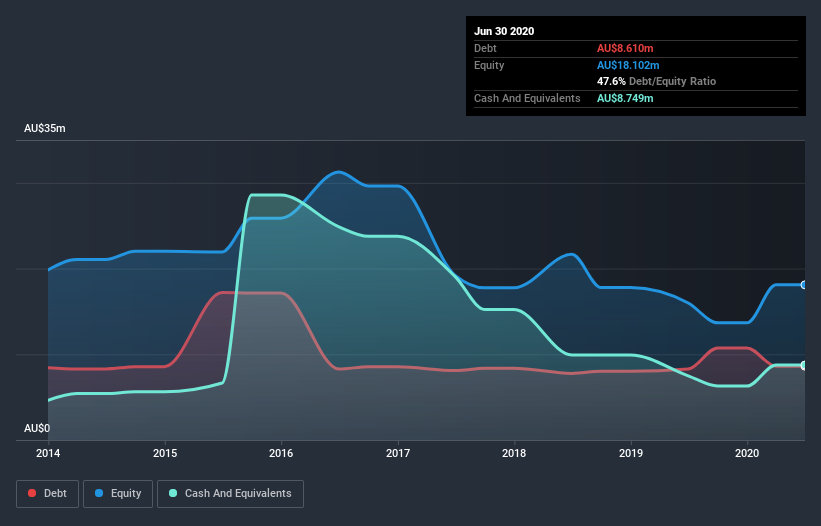Is Orbital (ASX:OEC) Weighed On By Its Debt Load?
Some say volatility, rather than debt, is the best way to think about risk as an investor, but Warren Buffett famously said that 'Volatility is far from synonymous with risk.' When we think about how risky a company is, we always like to look at its use of debt, since debt overload can lead to ruin. We note that Orbital Corporation Limited (ASX:OEC) does have debt on its balance sheet. But should shareholders be worried about its use of debt?
When Is Debt Dangerous?
Generally speaking, debt only becomes a real problem when a company can't easily pay it off, either by raising capital or with its own cash flow. Part and parcel of capitalism is the process of 'creative destruction' where failed businesses are mercilessly liquidated by their bankers. While that is not too common, we often do see indebted companies permanently diluting shareholders because lenders force them to raise capital at a distressed price. Of course, debt can be an important tool in businesses, particularly capital heavy businesses. When we examine debt levels, we first consider both cash and debt levels, together.
Check out our latest analysis for Orbital
What Is Orbital's Net Debt?
As you can see below, at the end of June 2020, Orbital had AU$8.61m of debt, up from AU$8.28m a year ago. Click the image for more detail. But it also has AU$8.75m in cash to offset that, meaning it has AU$139.0k net cash.
How Healthy Is Orbital's Balance Sheet?
According to the last reported balance sheet, Orbital had liabilities of AU$12.9m due within 12 months, and liabilities of AU$6.82m due beyond 12 months. Offsetting this, it had AU$8.75m in cash and AU$5.68m in receivables that were due within 12 months. So its liabilities total AU$5.31m more than the combination of its cash and short-term receivables.
Since publicly traded Orbital shares are worth a total of AU$93.9m, it seems unlikely that this level of liabilities would be a major threat. Having said that, it's clear that we should continue to monitor its balance sheet, lest it change for the worse. While it does have liabilities worth noting, Orbital also has more cash than debt, so we're pretty confident it can manage its debt safely. The balance sheet is clearly the area to focus on when you are analysing debt. But it is future earnings, more than anything, that will determine Orbital's ability to maintain a healthy balance sheet going forward. So if you're focused on the future you can check out this free report showing analyst profit forecasts.
In the last year Orbital wasn't profitable at an EBIT level, but managed to grow its revenue by 123%, to AU$34m. So its pretty obvious shareholders are hoping for more growth!
So How Risky Is Orbital?
While Orbital lost money on an earnings before interest and tax (EBIT) level, it actually booked a paper profit of AU$1.9m. So when you consider it has net cash, along with the statutory profit, the stock probably isn't as risky as it might seem, at least in the short term. The good news for Orbital shareholders is that its revenue growth is strong, making it easier to raise capital if need be. But we still think it's somewhat risky. The balance sheet is clearly the area to focus on when you are analysing debt. But ultimately, every company can contain risks that exist outside of the balance sheet. To that end, you should be aware of the 3 warning signs we've spotted with Orbital .
When all is said and done, sometimes its easier to focus on companies that don't even need debt. Readers can access a list of growth stocks with zero net debt 100% free, right now.
This article by Simply Wall St is general in nature. It does not constitute a recommendation to buy or sell any stock, and does not take account of your objectives, or your financial situation. We aim to bring you long-term focused analysis driven by fundamental data. Note that our analysis may not factor in the latest price-sensitive company announcements or qualitative material. Simply Wall St has no position in any stocks mentioned.
Have feedback on this article? Concerned about the content? Get in touch with us directly. Alternatively, email editorial-team@simplywallst.com.

 Yahoo Finance
Yahoo Finance 
